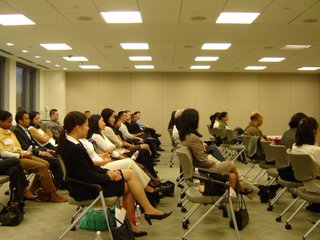Spotlight on Angela Oh Event
By Stephanie Carnes, PAR Committee Member

On September 20, 2006, more than 35 people attended a discussion with Angela Oh, a prominent professor, attorney, advocate, and race relations expert. APABA-DC’s Practicing Attorney Resource Committee organized the interview-style program. Anne-Marie Meegan moderated the event, which was graciously hosted at the law firm of Finnegan, Henderson, Farabow, Garrett & Dunner, LLP.
Ms. Oh began the evening by describing her unique career path. Born to a family of non-attorneys, Ms. Oh did not intend to practice law, and instead pursued options in the field of public health. However, she ultimately decided to obtain a law degree after her experiences as an activist in Sacramento, California. Ms. Oh attended law school at the University of California at Davis. Her early legal career included work in labor as well as criminal defense law.
Ms. Oh gained national prominence through her work in the area of race relations. She was already active in several Los Angeles community-based legal and social organizations when she was propelled onto the national stage. The shooting death of Latasha Harlins, a 15-year-old African-American teen by Soon Ja Du, a Korean-American grocery store owner, and the beating of Rodney King by members of the Los Angeles Police Department – as well as the controversial criminal justice response to these two events – exploded into the 1992 Los Angeles race riots. The riots, which lasted several days, resulted in violence and billions of dollars worth of property damage, including the burning and looting of many Korean-American owned businesses.
Ms. Oh disputed inaccurate depictions of the Korean-American community in the media and analyzed the riots as something deeper than the culmination of existing racial tensions between African-Americans and Korean-Americans. She viewed the riots as resulting from economic recession, deep demographic shifts in the community, the lack of investment in low-income communities, and degenerating police-community relations.
As a direct result of her advocacy during the 1992 riots, President Clinton appointed Ms. Oh to the seven-member Advisory Board to the President’s Initiative on Race, an effort by the President to look at race in the 21st Century context. Ms. Oh described the process by which she was asked to serve on the Board by the President. She also discussed the two reports issued by the Board and how those reports were overshadowed by the media’s focus on the Monica Lewinski scandal.
Ms. Oh provided her perspective on how best to approach the issues of race relations. She stated that it was important for those in the Asian community to become more aware of how they may be perceived by other groups. Additionally, she noted that advocates need to take a harder look at events occurring on the international stage as they can affect race relations and perceptions, such as the branding of North Korea as part of the “Axis of Evil.” Ms. Oh also spoke about the importance of using alternative dispute resolution techniques rather than litigation as a means to resolve conflict.
Finally, Ms. Oh also discussed her experiences as a Rinzai Sect Zen Buddhist priest and how those experiences influence her activities today.


0 Comments:
Post a Comment
<< Home